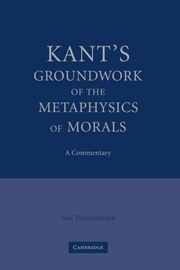Book contents
- Frontmatter
- Contents
- Acknowledgements
- Note on quotations from Kant's works
- Introduction
- Kant's Groundwork: synopsis of the argument
- Commentary
- Preface
- Section I Transition from common to philosophic moral cognition of reason
- Section II Transition from popular moral philosophy to the metaphysics of morals
- Section III Transition from the metaphysics of morals to the critique of pure practical reason
- Appendix A Schiller's scruples of conscience
- Appendix B The pervasiveness of morality
- Appendix C Universal legislation, ends and puzzle maxims
- Appendix D ‘Indirect duty’: Kantian consequentialism
- Appendix E Freedom and moral failure: Reinhold and Sidgwick
- Appendix F The project of a ‘metaphysics of morals’
- Glossary
- Bibliography
- Index
- References
Section III - Transition from the metaphysics of morals to the critique of pure practical reason
Published online by Cambridge University Press: 24 February 2010
- Frontmatter
- Contents
- Acknowledgements
- Note on quotations from Kant's works
- Introduction
- Kant's Groundwork: synopsis of the argument
- Commentary
- Preface
- Section I Transition from common to philosophic moral cognition of reason
- Section II Transition from popular moral philosophy to the metaphysics of morals
- Section III Transition from the metaphysics of morals to the critique of pure practical reason
- Appendix A Schiller's scruples of conscience
- Appendix B The pervasiveness of morality
- Appendix C Universal legislation, ends and puzzle maxims
- Appendix D ‘Indirect duty’: Kantian consequentialism
- Appendix E Freedom and moral failure: Reinhold and Sidgwick
- Appendix F The project of a ‘metaphysics of morals’
- Glossary
- Bibliography
- Index
- References
Summary
The third section of the Groundwork begins with the metaphysical concept of autonomy, which concluded the analysis of the second. However, Kant now ventures beyond explication: he tries to prove that our intuitive trust in a categorical command as the supreme normative principle of human conduct is justified. At the outset of Section III, the odds are heavily stacked against morality. Mere analysis cannot establish the validity of moral concepts; nor can they be justified with recourse to experience. For all we know about human agency so far we may well doubt whether moral terms have any significance for ourselves or for others at all. Autonomy might be an empty concept, and morality an illusion. Section III now asks whether we can make proper sense of autonomy. How is a categorical imperative possible, as a synthetic practical proposition a priori? A successful answer to this question is the element of a ‘Critique’ of pure practical reason required to complete the foundation of a metaphysics of morals.
The project of Section III divides into three stages. First, by way of preparation, Kant tries to trace the origins of the moral law. If autonomy is a legitimate concept, we have shown that human beings are subject to the moral law. Moral self-legislation is revealed to be a consequence of possessing freedom of the will; and we are conscious of our freedom – if indeed we are free – because we are members not just of the familiar world of experience but also of an intellectual or ‘intelligible’ world.
- Type
- Chapter
- Information
- Kant's Groundwork of the Metaphysics of MoralsA Commentary, pp. 120 - 151Publisher: Cambridge University PressPrint publication year: 2007



